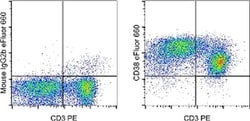Learn More
Invitrogen™ CD38 Monoclonal Antibody (14.27), eFluor™ 660, eBioscience™
Mouse Monoclonal Antibody
Supplier: Invitrogen™ 50038080

Description
Description: The monoclonal antibody 14.27 reacts with rat CD38, also known as ADP-ribosyl cyclase. CD38 is a type II transmembrane glycoprotein that is an ectoenzyme that catalyzes the synthesis and hydrolysis of cyclic adenosine diphosphate ribose (cADPR) and nicotinic acid adenine dinucleotide phosphate (NAADP). cADPR and NAADP are secondary messengers involved in calcium mobilization. CD38 can also act as a receptor for CD31 or agonist monoclonal antibodies. CD38 is expressed by leukocytes, early hematopoietic precursor cells, epithelial cells, astrocytes, some muscle cells, kidney cells, and thyroid cells. CD38 plays a role in the production of pro-inflammatory cytokines, proliferation, cell activation, cell migration, cell adhesion, and protection from apoptosis. Applications Reported: This 14.27 antibody has been reported for use in flow cytometric analysis. Applications Tested: This 14.27 antibody has been tested by flow cytometric analysis of rat splenocytes. This can be used at less than or equal to 0.25 μg per test. A test is defined as the amount (μg) of antibody that will stain a cell sample in a final volume of 100 μL. Cell number should be determined empirically but can range from 10^5 to 10^8 cells/test. It is recommended that the antibody be carefully titrated for optimal performance in the assay of interest. eFluor® 660 is a replacement for Alexa Fluor® 647. eFluor® 660 emits at 659 nm and is excited with the red laser (633 nm). Pleas...
CD38 (NAD+ glycohydrolase) is a type II transmembrane glycoprotein able to induce activation, proliferation and differentiation of mature lymphocytes and mediate apoptosis of myeloid and lymphoid progenitor cells. CD38 functions as a multi-catalytic ectoenzyme serving as ADP-ribosyl cyclase, cyclic ADP-ribose hydrolase and possibly NAD+ glycohydrolase or as a cell surface receptor. Antibodies to CD38 are useful in subtyping of lymphomas and leukemias, detection of plasma cells (i.e. identification of myelomas), and as a marker for activated B and T cells. CD38 participates in cell adhesion, signal transduction and calcium signaling. Further, CD38 is expressed at high levels in the pancreas, liver, kidney, malignant lymphoma and neuroblastoma. Diseases associated with CD38 dysfunction include chronic lymphocytic leukemia and Richter's Syndrome.
Specifications
| CD38 | |
| Monoclonal | |
| 0.2 mg/mL | |
| PBS with 0.09% sodium azide; pH 7.2 | |
| Q64244 | |
| CD38 | |
| Affinity Chromatography | |
| RUO | |
| 25668 | |
| 4°C, store in dark, DO NOT FREEZE! | |
| Liquid |
| Flow Cytometry | |
| 14.27 | |
| eFluor 660 | |
| CD38 | |
| 2'-phospho-ADP-ribosyl cyclase; 2'-phospho-ADP-ribosyl cyclase/2'-phospho-cyclic-ADP-ribose transferase; 2'-phospho-cyclic-ADP-ribose transferase; ADPRC 1; ADPRC1; ADP-ribosyl cyclase 1; ADP-ribosyl cyclase/cyclic ADP-ribose hydrolase 1; cADPr hydrolase 1; Cd38; CD38 antigen; CD38 antigen (ADP-ribosyl cyclase / cyclic ADP-ribose hydrolase); CD38 antigen (p45); CD38 antigen p45; CD38 molecule; CD38H; Cd38-rs1; cluster of differentiation 38; cyclic ADP-ribose hydrolase 1; ecto-nicotinamide adenine dinucleotide glycohydrolase; I-19; NAD(+) nucleosidase; NAD+ nucleosidase; NIM-R5 antigen; T10 | |
| Mouse | |
| 25 μg | |
| Primary | |
| Rat | |
| Antibody | |
| IgG2b κ |
The Fisher Scientific Encompass Program offers items which are not part of our distribution portfolio. These products typically do not have pictures or detailed descriptions. However, we are committed to improving your shopping experience. Please use the form below to provide feedback related to the content on this product.
